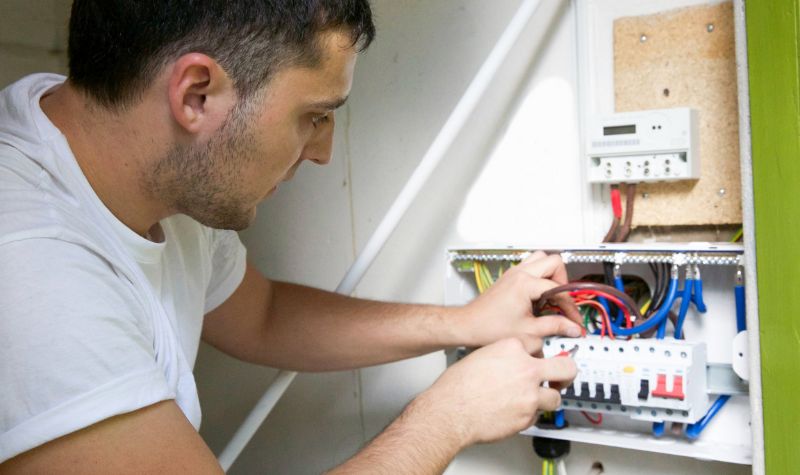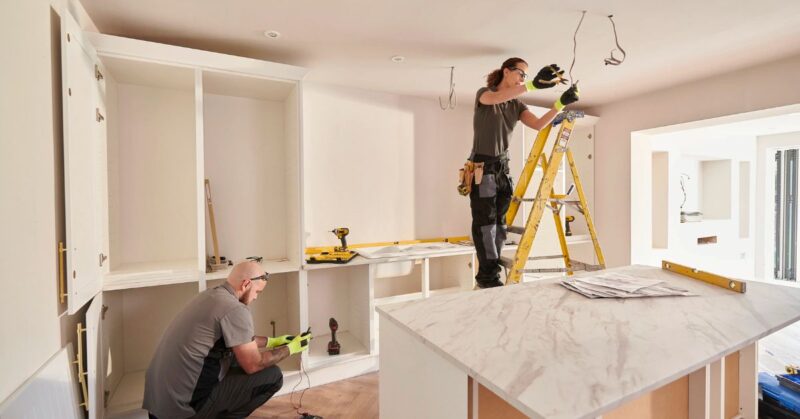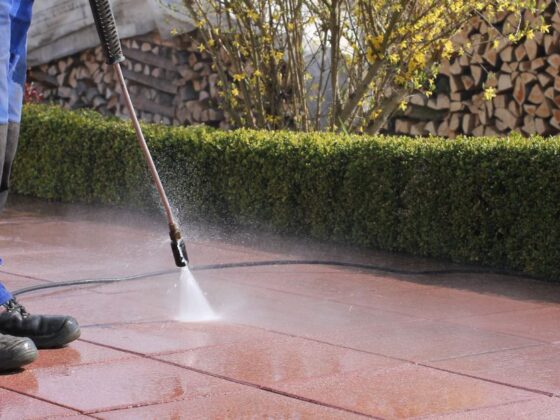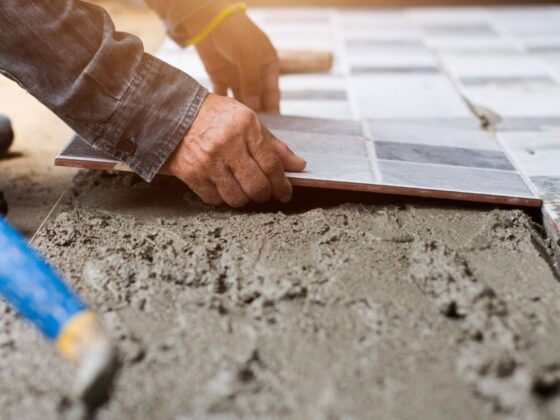Older homes might have unique charm, but their outdated electrical systems can be a big trouble. Updating wiring is often necessary to support modern appliances, technology, and safety needs. But, exactly How Much Does It Cost To Rewire A House?
Well, it may cost you between $1,500 to $30,000, depending on some key factors like your home size, age, extent of work, materials, wiring access, labor rates, and more. Let’s briefly explore these elements and the costs of rewiring a house.
How Much Does It Cost To Rewire A House In 2025?

Mostly older homes often have outdated wiring systems like aluminum wiring and knob-and-tube, which pose significant safety risks. Signs like flickering lights or frequent breaker trips may indicate it’s time to rewire.
These signs and systems can increase the risk of electrical shock or fire. That’s why their wiring should be upgraded over time. For this, you may hire a licensed electrician to ensure safety, efficiency, and code compliance.
1. What Is The Average Cost To Rewire A House Per Square Foot?
The cost of electrical wiring varies by house size, ranging from $0.10 to $10 per square foot. For example, a smaller house covering 500 to 800 square feet may cost $2,800 to $5,000 for rewiring, while larger homes covering over 3,500 square feet may cost $14,000 to $25,000 and more, depending on your materials and labor rates. Moreover, these rates also depend on your number of rooms, their layout, and the floors.
| HOUSE SIZE (SQ FT) | TOTAL AVERAGE COST | COST PER LINEAR FOOT | TIMEFRAME | KEY CONSIDERATIONS |
|---|---|---|---|---|
| 500-800 | $2,800 - $5,000 | $3.50 - $6.25 | 2-4 days | Compact homes, minimal circuits, often doesn't require service panel upgrade |
| 800-1,000 | $3,500 - $6,500 | $3.25 - $6.00 | 3-5 days | Basic rewiring, may need minor panel upgrades (100-150 amp) |
| 1,000-1,500 | $4,500 - $8,000 | $3.00 - $5.50 | 4-7 days | Standard homes often need 200-amp panel, GFCI/AFCI protection |
| 1,500-2,000 | $6,000 - $10,000 | $2.75 - $5.00 | 6-9 days | Economies of scale apply, dedicated circuits for appliances |
| 2,000-2,500 | $8,000 - $13,000 | $2.50 - $4.75 | 8-12 days | Multi-story complexity, smart home pre-wiring common |
| 2,500-3,500 | $10,000 - $16,000 | $2.25 - $4.50 | 10-14 days | Sub-panels often needed, premium materials common |
| 3,500+ | $14,000 - $25,000+ | $2.00 - $4.25 | 2-3 weeks | Commercial-grade wiring, whole-home surge protection standard |
2. What Is The Average Cost to Rewire a House Per Material?
Apart from your house size, rewiring cost also depends on your chosen material, like wires, electrical panel components, circuits, switches, and more.
| CATEGORY | MATERIAL TYPE | COST PER UNIT | TYPICAL USE | NOTES |
|---|---|---|---|---|
| WIRING | ||||
| Wiring | THHN/THWN-2 (12 AWG Copper) | $0.18 - $0.35/ft | Conduit wiring, wet locations | Most common for new construction |
| Wiring | NM-B (Romex 12/2 w/gnd) | $0.45 - $0.65/ft | Residential interior wiring | Standard for dry locations |
| ELECTRICAL BOXES | ||||
| Boxes | Single-gang plastic box | $0.75 - $1.50 | Standard outlets/switches | Nail-on or old-work style |
| Boxes | Double-gang metal box | $3.50 - $6.00 | Heavy-duty applications | Required for commercial |
| CIRCUIT PROTECTION | ||||
| Breakers | 15A Single-pole (standard) | $5 - $12 | Lighting circuits | Brand-specific (Square D, etc.) |
| Breakers | 20A GFCI breaker | $40 - $70 | Wet locations | Required for bathrooms/kitchens |
| DEVICES | ||||
| Outlets | Standard 15A duplex | $0.80 - $2.50 | General purpose | Commercial grade costs more |
| Switches | Single-pole toggle | $1.20 - $4.00 | Light controls | Decora style costs 2x more |
| CONDUIT & RUNS | ||||
| Conduit | 1/2" EMT (metal) | $0.40 - $0.70/ft | Exposed wiring | Requires bending tools |
| Conduit | 3/4" PVC (schedule 40) | $0.30 - $0.60/ft | Underground runs | UV-resistant for outdoor use |
| PANEL COMPONENTS | ||||
| Panel | 200A Main breaker panel | $150 - $400 | Whole house service | Brand and space variations |
| Panel | Subpanel (60A) | $80 - $200 | Garages/additions | Fewer spaces than main |
Three types of cables are generally used for house wiring. The first budget-friendly option is THHN/THWN wire, which is durable, heat-resistant, and suitable for unfinished spaces, like basements. They range between $0.15 to $0.50 per foot and are often used for appliances like water heaters and garbage disposals.
The second one is non-metallic or NM sheathed cables, costing between $0.20 to $0.80 per foot. They contain multiple THHN conductors and are popular for homes and ADUs. However, don’t use them for high-heat applications or in moist areas.
And the last is Underground Feeder cables, which cost between $0.30 to $1.00 per linear foot. They are ideal for bringing electricity to outdoor spaces and are often used for underground installations. They can also be used in moist areas or even for high-heat applications.
3. What Is The Average Cost to Rewire a House Per Project?
Each project has its own specific needs and complexities that affect the overall cost. This cost depends on various smaller tasks like installing new switches or outlets, drilling or wiring, or upgrading panels.
| PROJECT TYPE | SCOPE OF WORK | AVERAGE COST | TIMEFRAME | NOTES |
|---|---|---|---|---|
| PANEL UPGRADES | ||||
| Service Upgrade | 100A to 200A panel replacement | $1,800 - $3,500 | 6-10 hours | Includes new meter base & breakers |
| Subpanel Installation | 60A subpanel (8 circuits) | $800 - $1,500 | 4-6 hours | For garages or home additions |
| ADDING OUTLETS & SWITCHES | ||||
| Standard Outlet | New 15A duplex receptacle | $150 - $300 | 1-2 hours | Price drops for multiple outlets |
| GFCI Outlet | Wet location installation | $175 - $350 | 1-2 hours | Required for kitchens/bathrooms |
| Light Switch | Single-pole switch install | $125 - $250 | 1-2 hours | Add $75+ for dimmers |
| DRILLING & WIRING | ||||
| Single Room Rewire | 12x12 bedroom (6 circuits) | $1,200 - $2,500 | 1-2 days | Includes patching small openings |
| Whole House Rewire | 1,500 sq ft home | $8,000 - $15,000 | 5-8 days | Minimal wall damage approach |
| Knob-and-Tube Replacement | Per square foot | $7 - $12/sq ft | Varies by size | Historic homes cost 20% more |
| SPECIALTY INSTALLATIONS | ||||
| EV Charger | 240V 50A circuit | $800 - $2,000 | 4-8 hours | Depends on panel distance |
| Whole-Home Surge | Panel-mounted protector | $300 - $600 | 1-2 hours | Recommended for new panels |
Key Factors That Impact House Rewiring Costs
The house rewiring cost greatly impacts due to your house size and the chosen quality of wiring. However, many other key factors, like house age, labor, permits, and work extent, that decide the overall cost of complete house rewiring.
1. House Age & Layout
Older houses, especially those built almost fifty years ago, often require more rewiring work because they weren’t built for modern needs. The smaller tasks, like upgrading old wiring, opening walls to access wiring, and replacing outlets, result in more project cost. On the other hand, newer home building might only require partial rewiring.
The house rewiring costs also depend on its size and complexity. Larger, multi-story homes with complex spaces like basements and attics require more labor and materials. While smaller single-story houses with easy-to-access walls have lower rewiring costs due to. Your house structure, like wall type, access to tight spaces, and asbestos presence, may also impact the overall house rewiring cost.
| Home Age | Home Type | Average Cost | Time Needed |
|---|---|---|---|
| Pre-1950 | Small Bungalow | $8,000 - $15,000 | 3-5 days |
| Pre-1950 | Large Colonial | $18,000 - $30,000 | 7-10 days |
| 1950-1980 | Ranch Style | $6,500 - $12,000 | 4-6 days |
| 1950-1980 | Split-Level | $10,000 - $18,000 | 5-8 days |
| 1980-2000 | Contemporary | $7,000 - $14,000 | 4-7 days |
| 2000-Present | Open Concept | $5,000 - $12,000 | 3-6 days |
2. Permits & Inspections
Before rewiring, make sure to get a permit, which may cost you between $50 to $500, depending on your location and local regulations. These requirements ensure a safe electrical system.
| Requirement | Average Cost | When Needed | Notes |
|---|---|---|---|
| Electrical Permit | $50 - $300 | Before work begins | Based on home size and project scope |
| Rough-In Inspection | $100 - $250 | After wiring, before walls close | Some localities include 1 free inspection |
| Final Inspection | $100 - $300 | When project is complete | Required to close permit |
| Service Upgrade Permit | $150 - $500 | For panel replacements | Often separate from wiring permit |
3. Extent Of Work
Your job extent also impacts the overall project costs. For example, smaller projects like wiring a shed, new alarm system, installing ceiling fans, upgrading the electric panel, and adding new outlets cost less than big rewiring projects. Consider running wiring for outdoor lights for your landscaping or for your newly built inground pool to give it a stunning look in the evenings.
| Project | Average Cost | Time Needed | Notes |
|---|---|---|---|
| Wiring a Shed | $800 - $2,500 | 1-2 days | Depends on distance from main panel |
| New Alarm System | $500 - $1,500 | 4-8 hours | Basic hardwired system |
| Installing Ceiling Fan | $150 - $350 | 2-4 hours | Includes wiring if box exists |
| Upgrading Electric Panel | $1,200 - $3,500 | 6-10 hours | 100A to 200A upgrade |
| Outdoor Lighting Wiring | $600 - $1,800 | 1-2 days | For 4-6 light fixtures |
| Adding New Outlet | $150 - $350 | 1-3 hours | Standard 15A duplex |
4. Labor
Electricians charge $50 to $150 per hour, depending on your project complexity and location. Some electricals also charge as per your project, like panel upgradation and installation of a ceiling fan.
| Labor Task | Hourly Rate | Per Project Cost | Time Required |
|---|---|---|---|
| Basic Wiring (per electrician) | $50 - $100/hr | $1,500 - $3,500 | 30-50 hours |
| Panel Upgrade | $75 - $120/hr | $800 - $2,500 | 8-20 hours |
| Outlet/Switch Installation | $50 - $90/hr | $80 - $200 each | 1-2 hours each |
| Ceiling Fan Installation | $60 - $100/hr | $150 - $300 | 2-4 hours |
| Wall Fishing (per run) | $65 - $110/hr | $100 - $300 | 1-3 hours |
| Emergency Service | $100 - $150/hr | $300 minimum | 3-hour minimum |
When Do You Need To Rewire A House?
When looking for how much does it cost to rewire a house, it’s also crucial to look for when your house needs rewiring. I’m writing some points for you to look for and keep in mind when thinking about the rewiring house project to prevent fires, electrocution, and other safety hazards.
- Flickering or dimming lights
- Popping sounds from outlets
- Frequent fuses or circuit breaker trips
- Sparks or electric shocks from switches
- Buzzing sounds or burning smell from outlets
- Warm, burnt, or discolored switches or outlet covers
Apart from these, there are some other considerations too. If your house is over thirty years old, doesn’t meet current NEC standards, or the original wiring hasn’t been updated or evaluated, you should upgrade your wiring system. Moreover, if your house has outdated aluminum or knob-and-tube wiring, an old electrical panel with fuses, and two-prong ungrounded outlets, consider consulting a licensed electrician to ensure your home’s electrical system is safe and efficient.
It’s also important to hire a professional for wiring inspection when buying an older home. If you notice issues, schedule an electrician appointment.
Money Saving Tips For House Rewiring
Rewiring a house is, no doubt, a great investment, but it may save you from great losses. Below are some key tips for how to lower the rewiring cost for house.
| Cost-Saving Tip | Potential Savings | Implementation |
|---|---|---|
| Combine projects during renovation | 15-25% | Schedule wiring when walls are already open |
| Use existing wire paths | $500-$2,000 | Reuse conduits and avoid new wall openings |
| Partial rewiring (non-critical areas) | 30-50% | Only replace outdated/dangerous wiring |
| Get multiple quotes | 10-20% | Compare 3+ licensed electricians |
| DIY prep work | $1,000+ | Remove old fixtures/drywall (if permitted) |
| Standard materials | $0.50-$1.50/ft | Choose NM-B over conduit where allowed |
| Off-season scheduling | 5-15% | Winter months (except holidays) |
Apart from the above points, here are some more tips to save on your rewiring project.
- Consider upgrading only what’s necessary.
- Partial rewiring for critical areas
- Buy energy-efficient materials and wiring like THHN/THWN wires in bulk.
- Plan the project efficiently to minimize labor hours.
- Bundle the project with other home renovations.
- Prioritize safety and quality workmanship when saving costs.
Summary
Rewiring your house is a must-thing to do, especially if you’re house age is over 30 and its wiring has not been updated since. It may cost you between $0.10 to $10, depending on your project size, complexity, accessibility, and materials. Updating your electrical system protects your home from hazards and prepares it for modern technology.
Frequently Asked Questions (FAQs)
Is It Worth Rewiring An Old House?
Rewiring an old house is really worth it as it protects your electronics, prevents electrical shock, offers safety benefits, and peace of mind.
Does Homeowners Insurance Cover Rewiring?
Homeowners’ insurance may cover rewiring costs if a storm, fire, or lightning strike causes damage. However, it typically doesn’t cover rewiring costs due to normal wear and tear or when the wiring gets old and wears out.
How Long Does It Take To Rewire A House?
Rewiring time varies from some hours to several days, depending on the extent of rewiring, property size, and accessibility. Smaller houses take 1 to 3 days while larger properties take several weeks.
Can A House Be Rewired Without Removing Drywall?
Rewiring a house doesn’t always require removing all drywall. Skilled electricians can use techniques to minimize disruption and preserve drywall.
What Is The Cost Per Square Foot To Rewire?
Rewiring a complete house may cost from $0.1 $10 per square foot, depending on your house size, labor, materials, and project complexity.





